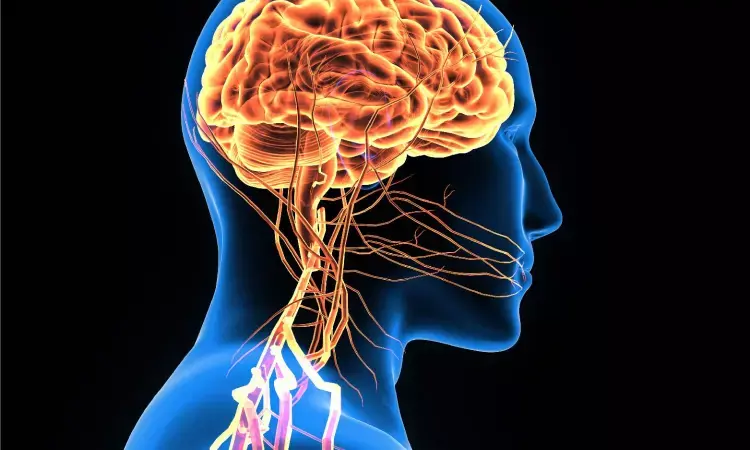- Home
- Medical news & Guidelines
- Anesthesiology
- Cardiology and CTVS
- Critical Care
- Dentistry
- Dermatology
- Diabetes and Endocrinology
- ENT
- Gastroenterology
- Medicine
- Nephrology
- Neurology
- Obstretics-Gynaecology
- Oncology
- Ophthalmology
- Orthopaedics
- Pediatrics-Neonatology
- Psychiatry
- Pulmonology
- Radiology
- Surgery
- Urology
- Laboratory Medicine
- Diet
- Nursing
- Paramedical
- Physiotherapy
- Health news
- Fact Check
- Bone Health Fact Check
- Brain Health Fact Check
- Cancer Related Fact Check
- Child Care Fact Check
- Dental and oral health fact check
- Diabetes and metabolic health fact check
- Diet and Nutrition Fact Check
- Eye and ENT Care Fact Check
- Fitness fact check
- Gut health fact check
- Heart health fact check
- Kidney health fact check
- Medical education fact check
- Men's health fact check
- Respiratory fact check
- Skin and hair care fact check
- Vaccine and Immunization fact check
- Women's health fact check
- AYUSH
- State News
- Andaman and Nicobar Islands
- Andhra Pradesh
- Arunachal Pradesh
- Assam
- Bihar
- Chandigarh
- Chattisgarh
- Dadra and Nagar Haveli
- Daman and Diu
- Delhi
- Goa
- Gujarat
- Haryana
- Himachal Pradesh
- Jammu & Kashmir
- Jharkhand
- Karnataka
- Kerala
- Ladakh
- Lakshadweep
- Madhya Pradesh
- Maharashtra
- Manipur
- Meghalaya
- Mizoram
- Nagaland
- Odisha
- Puducherry
- Punjab
- Rajasthan
- Sikkim
- Tamil Nadu
- Telangana
- Tripura
- Uttar Pradesh
- Uttrakhand
- West Bengal
- Medical Education
- Industry
Noninvasive vagus nerve stimulation promising for treating postural tachycardia syndrome

USA: Findings from a recent study published in JACC: Clinical Electrophysiology support the emerging paradigm of noninvasive neuromodulation for treating postural tachycardia syndrome (POTS). This effect, mechanistically, appears to be related to a reduction of inflammatory cytokines and antiautonomic autoantibodies, and an improvement in autonomic tone.
Low-level transcutaneous stimulation of the auricular branch of the vagus nerve at the tragus is anti-inflammatory and antiarrhythmic in humans and animals. Preliminary studies demonstrated that transcutaneous vagus nerve stimulation (tVNS) benefits animal models of POTS. Stavros Stavrakis, University of Oklahoma Health Sciences Center, Oklahoma, USA, and colleagues conducted a double-blind, sham-controlled, randomized clinical trial to investigate the effect of tVNS on POTS over 2 months relative to sham stimulation.
For this purpose, the researchers delivered transcutaneous vagus nerve stimulation (20 Hz, 1 mA below discomfort threshold) using an ear clip attached to either the tragus (active; n = 12) or the ear lobe (sham; n = 14) daily for 1 hour over 2 months. Postural tachycardia was evaluated during the baseline and 2-month visit. Heart rate variability based on a 5-minute electrocardiogram, antiautonomic autoantibodies, and serum cytokines were measured at the respective time points. The mean age of the participants was 34 ± 11 years (100% female; 81% Caucasian).
The study revealed the following findings:
- Adherence to daily stimulation was 83% in the active arm and 86% in the sham arm.
- Postural tachycardia was significantly less in the active arm compared with the sham arm at two months (mean postural increase in heart rate 17.6 ± 9.9 beats/min vs 31.7 ± 14.4 beats/min).
- Antiadrenergic autoantibodies and inflammatory cytokines were lower in the active arm compared with the sham arm at 2 months.
- Heart rate variability was better in the active arm.
- No device-related side effects were observed.
"Our findings support the emerging paradigm of noninvasive neuromodulation for POTS treatment," the researchers wrote. "Mechanistically, this effect appears to be related to a reduction of inflammatory cytokines and anti-autonomic autoantibodies, and an improvement in autonomic tone."
"Further studies are warranted," they concluded.
Reference:
Stavrakis S, Chakraborty P, Farhat K, Whyte S, Morris L, Abideen Asad ZU, Karfonta B, Anjum J, Matlock HG, Cai X, Yu X. Noninvasive Vagus Nerve Stimulation in Postural Tachycardia Syndrome: A Randomized Clinical Trial. JACC Clin Electrophysiol. 2023 Nov 10:S2405-500X(23)00806-X. doi: 10.1016/j.jacep.2023.10.015. Epub ahead of print. PMID: 37999672.
Dr Kamal Kant Kohli-MBBS, DTCD- a chest specialist with more than 30 years of practice and a flair for writing clinical articles, Dr Kamal Kant Kohli joined Medical Dialogues as a Chief Editor of Medical News. Besides writing articles, as an editor, he proofreads and verifies all the medical content published on Medical Dialogues including those coming from journals, studies,medical conferences,guidelines etc. Email: drkohli@medicaldialogues.in. Contact no. 011-43720751


